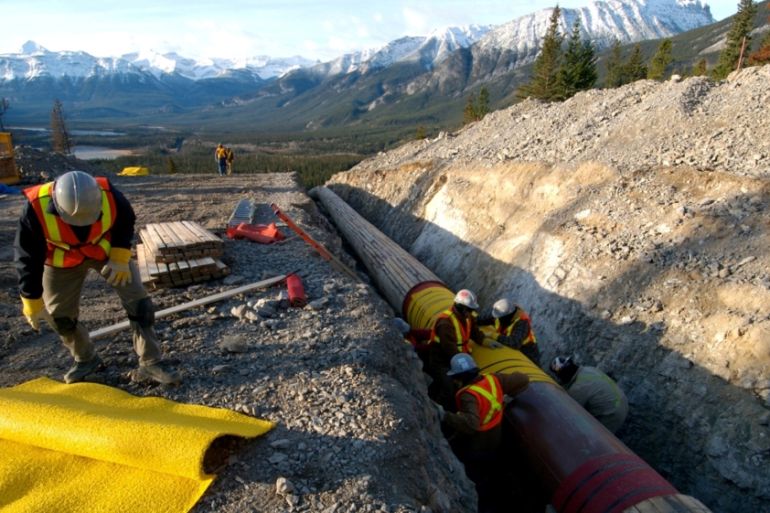Canada’s BC submits new rules to restrict oil shipments
New regulations proposed in British Columbia are seen as a blow to a contentious oil pipeline expansion project.

The government of British Columbia has proposed new regulations restricting the transportation of oil through the western Canadian province in what is expected to be a major setback for a planned pipeline expansion project.
The province announced on Tuesday it would seek the public’s feedback on the newly proposed regulations, which include “restrictions on the increase of diluted bitumen transportation” through BC.
Keep reading
list of 4 itemsAre seed-sowing drones the answer to global deforestation?
Rainfall set to help crews battling wildfire near Canada’s Fort McMurray
The Alabama town living and dying in the shadow of chemical plants
The restrictions would be in place “until the behaviour of spilled bitumen can be better understood and there is certainty regarding the ability to adequately mitigate spills”, the provincial government said in a statement.
The province aims “to improve preparedness, response and recovery from potential spills”, the statement added.
George Heyman, BC’s minister of environment and climate change strategy, said that “the people of BC need to know that there is effective spill management across the province and, in particular, for our most environmentally sensitive areas, including coastlines.”
The move is widely believed to target Kinder Morgan’s $5bn Trans Mountain pipeline expansion project, which would transport 890,000 barrels of oil a day from the Alberta tar sands to the BC coast for shipment to Asia and other markets.
Al Jazeera could not immediately reach Kinder Morgan for comment.
“Kinder Morgan is aware of the Government’s announcement today and will actively participate in their engagement and feedback process,” Trans Mountain spokesperson Ali Hounsell told The Financial Post in an email.
‘Good news for the climate’
Justin Trudeau, Canada’s prime minister, approved the expansion project in 2016 amid opposition from environmental and First Nations groups across the country.
Environmental activist Cameron Fenton, a Canadian campaigner with the group 350.org, welcomed BC’s decision on Tuesday.
“When it comes to fossil fuel expansion, especially massive tar sands projects like Kinder Morgan, the rule of ‘when you’re in a hole, stop digging’ is a good place to start. This announcement from the government of BC does just that,” Fenton said in a statement.
“As of today, there’s a moratorium on new tar sands shipments to the West Coast, and that’s good news for the climate and communities.”
The BC government, a coalition between the left-leaning New Democrats and the Green Party, had previously vowed to block pipeline expansion through the province.
Kinder Morgan says the pipeline expansion project will create short and long-term jobs, increase tax revenues at the provincial and federal levels, and “increase the value of Canadian oil”.
But protesters have rallied in cities across Canada against the Trans Mountain pipeline expansion project for several years.
They say an oil spill would endanger drinking water and harm fish and other species off the coast of BC and worsen Canada’s environmental footprint.
Indigenous communities along the pipeline route previously vowed to block the project from being completed.
The Treaty Alliance, a coalition of more than 100 indigenous tribes across North America, said in 2016 that the project would not “see the light of day”.
“The world might not be able to immediately stop using oil tomorrow, but the last thing it needs is more oil, and especially not more of the dirtiest oil on the planet,” the group says on its website.